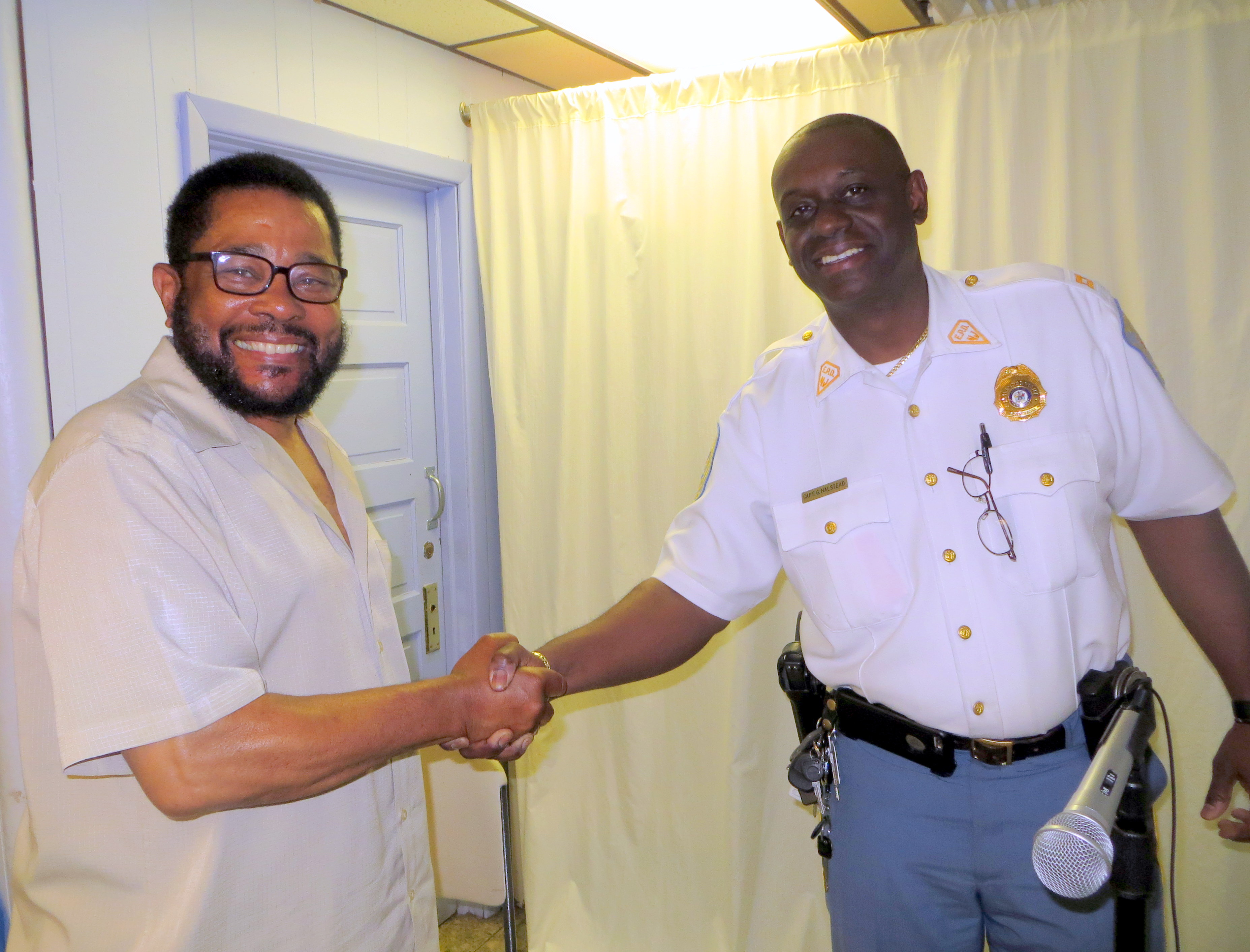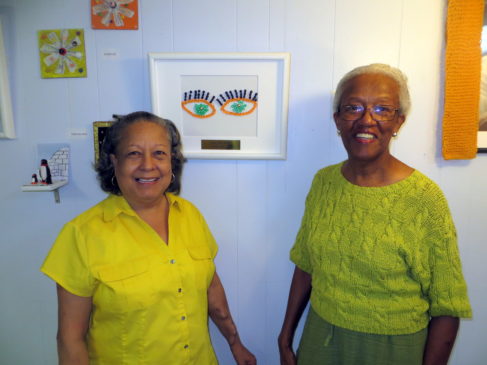
BY HILLARY VIDERS
SPECIAL TO NORTHERN VALLEY PRESS
On Thursday, July 13, the Englewood Police Department hosted another outreach program for the community.
This presentation was made by Gregory Halstead, captain of Uniformed Operations Commanding Officer, Patrol Division, and it focused on scams that target seniors.
Fraudulent practices perpetrated via telephone and in person were discussed with 35 seniors at the Bethany Presbyterian Church in Englewood. Halstead received a warm welcome from everyone, including the church’s pastor, Rev. Adrien McFarlane.
The Englewood Police Department’s preventative fraud initiative is extremely timely, because fleecing people has become a huge business. The National Center for Victims of Crime puts the annual total cost of scams in the $40 billion to $50 billion range, making it a national crisis. The Met Life Report calls financial fraud “the crime of the 21st century.” The agency also reports that seniors are particularly vulnerable to scams and they lose nearly $13 billion a year on them.
People 60 years and older comprise 26 percent of all fraud complaints tracked by the Federal Trade Commission – the most of any age group. One in every five Americans age 65 or older has been abused financially, according to a 2010 survey by the Investor Protection Trust, a financial-education organization.
The 2016 amendments to the Telemarketing and Consumer Fraud and Abuse Prevention Act draw on several notorious cases of seniors losing everything to fraudsters. Seniors who are scammed don’t just lose money; they lose their homes, their sense of security and their dignity.
Financial fraud experts advise that senior citizens in particular should be aware of scams for the following reasons:

• Senior citizens are most likely to have a “nest egg,” to own their home, and/or to have excellent credit – all of which make them attractive to con artists.
• People who grew up in the 1930s, 1940s and 1950s were generally raised to be polite and trusting. Con artists exploit these traits, knowing that it is difficult or impossible for these individuals to say “no” or just hang up the telephone.
• Older Americans are less likely to report a fraud because they don’t know who to report it to, are too ashamed at having been scammed or don’t know they have been scammed. Elderly victims may not report crimes, for example, because they are concerned that relatives may think the victims no longer have the mental capacity to take care of their own financial affairs.
• When an elderly victim does report the crime, they often make poor witnesses. Con artists know the effects of age on memory, and they are counting on elderly victims not being able to supply enough detailed information to investigators.
In addition, the victims’ realization that they have been swindled may take weeks – or more likely, months – after contact with the fraudster. This extended time frame makes it even more difficult to remember details from the events.
In his presentation, Halstead touched on specific types of senior scams.
“Telephonic is a preferred method and the perpetrators employ tactics to instill a sense of either fear or trust in their intended victims. The calls are usually made from overseas or spoofed in such a manner that makes it near impossible to track,” he said. Halstead asked how many people present had been approached by someone trying to pull off a scam. Just about every hand in the room went up.
Halstead proceeded to describe one of the most prominent cases seen by city police, a caller purporting to be someone either from the IRS or PSE&G.
“The caller advises that the customer is in arrears and that an immediate payment is needed in order to avert a suspension of service or in some cases some other legal action,” Halstead said.
The fraudulent caller tells victims to visit a pharmacy and purchase a pre-paid money card to settle the balance, and then share the card number or PIN. Agencies like the IRS or PSE&G simply do not request payments in that way, Halstead said.
“Unfortunately by that time, the victim has already been defrauded and the funds are already gone,” he said. To illustrate this point, Halstead passed out samples of pre-paid money cards that have been used in this kind of scam.
Halstead then discussed another prominent phone scam: the receipt of an automated call advising that your credit card activity has been monitored for some time by the credit bureaus and due to your outstanding payment history you now qualify for a reduced interest rate on your existing credit cards. The scammer will pretend to know your credit card number by mentioning that it begins with a “4” if it is a Visa card or a “5” if it’s a Mastercard. Unfortunately, every card issued by those credit card companies begins with those numbers, but most people aren’t aware of that fact. After interest is piqued, and the number is dialed to be connected to a “live operator,” the victim is asked to “re-verify” the credit card number and the expiration date and number of the card on which the “lower interest rate” is being sought. Needless to say, once they have the card number it now becomes a situation where that credit card has been compromised and fraudulent activity is not far behind.
It is very difficult to apprehend the criminals, as many scams are initiated from oversees. Even when fraudsters are caught, the penalties are light, because a scam is considered a “victimless crime.”
“So,” Halstead explained, “there are people who make these bogus calls all day. If you have $5,000 on your credit card, fraudsters can clean it out in under three minutes. If you times this amount by the hundreds of calls that these people make every day, you can see how profitable fraud is!”
Halstead discussed a third telephone ruse, one that involves a call from a purported lawyer pertaining to a relative or loved one.
“The scam will usually involve a grandchild and the caller will explain that the grandchild has gotten themselves in a legal issue (possibly jail) and that a substantial amount of money would be needed in order to rectify the situation. The caller will instruct the victim to wire funds from Western Union either out of state or to a foreign country. Unfortunately, some people will proceed with the wire transfer before ascertaining that their family member is not in any danger and the call is a hoax.”
He advised the group that, “If you receive a call like this, phone your loved one, and most probably, you will find that he or she is absolutely fine.”
There are also numerous scams perpetrated in person, Halstead said.
“One of the most frequently used is an individual dressed like a representative from a utility company advising of a problem on the exterior of a potential victim’s home or someone wishing to provide a potential victim with an estimate for home repairs or improvements,” he said. “The object is to distract the homeowner outside while an accomplice gains entry to the interior of the home (usually through the now unlocked door) and commits a burglary.”
“Utility companies require that their employees wear specific uniforms and carry identification that clearly delineates with whom they are employed,” said Halstead. “So, if you are ever in doubt about a utility worker who comes to your door, call the utility company to verify the purpose of the visit.”
Halstead urged the audience to reach out to the police department if they receive a similar telephone call.
“Through some simple investigative methods, we can determine if the calls are of a legitimate nature or if they were the potential victim of someone with illicit intent,” he said. “If it seems too good to be true, it is! In the real world, you do not win something that you have never participated in.
“Never give out your personal information on the phone to anyone you do not know or if you did not initiate the call. Just call and check with the real agency purporting to notify you of your good fortune,” said Halstead.
Photos by Hillary Viders
